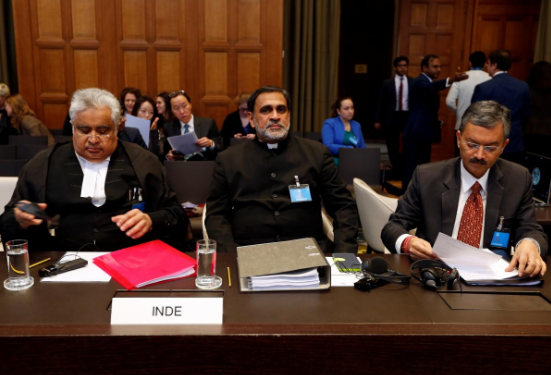The Hague: The International Court of Justice Tuesday refused to entertain Pakistan’s request to adjourn the hearing in the case of Kulbhushan Jadhav to appoint a new ad-hoc judge.
The four-day hearing in the Jadhav case opened Monday at the ICJ headquarters in The Hague amidst heightened tensions between India and Pakistan following one of the worst terror attacks in Jammu and Kashmir.
Pakistan, which presented its case Tuesday, asked the judge to adjourn the case, citing the illness of its ad-hoc judge.
Tassaduq Hussain Jillani, the ad-hoc judge for Pakistan in the ICJ suffered a cardiac attack ahead of the hearing.
Attorney General Anwar Mansoor Khan, who is representing Pakistan, at the start of the hearing said, “We applied our right provided to us that we can appoint an ad hoc judge.”
“Pakistan would like to place before the court that another judge to be sworn in which right has been provided under Article 35-5 and the judge be given ample time to go through the briefings before going ahead with arguments,” he said.
However, the world court declined Pakistan’s plea and asked it to continue argument in the absence on ad-hoc judge.
His arguments came a day after India Monday urged the ICJ to annul Jadhav’s death sentence by the Pakistani military court and order his immediate release.
“India seeks relief in declaring that the trial by the military court in Pakistan hopelessly fails to satisfy even the minimum standards of due process and should be declared unlawful,” said Harish Salve, the former solicitor general of India, who was presenting India’s case before the ICJ.
After the hearing, the Chief Judge adjourned the court till Wednesday when India will have a maximum of 90 minutes to submit its final arguments in the case. Pakistan will also get 90 minutes to respond to India’s arguments on the day.
The ICJ is expected to deliver its verdict in the summer of 2019.
What is the Kulbhushan Jadhav case?
Kulbhushan Jadhav, a retired Indian Navy officer, was sentenced to death by a Pakistani military court on charges of “espionage and terrorism” after a closed trial in April 2017. His sentencing evoked a sharp reaction in India. India moved the ICJ in May the same year for the “egregious violation” of the provisions of the Vienna Convention by Pakistan by repeatedly denying New Delhi consular access to the 48-year-old Indian national.

